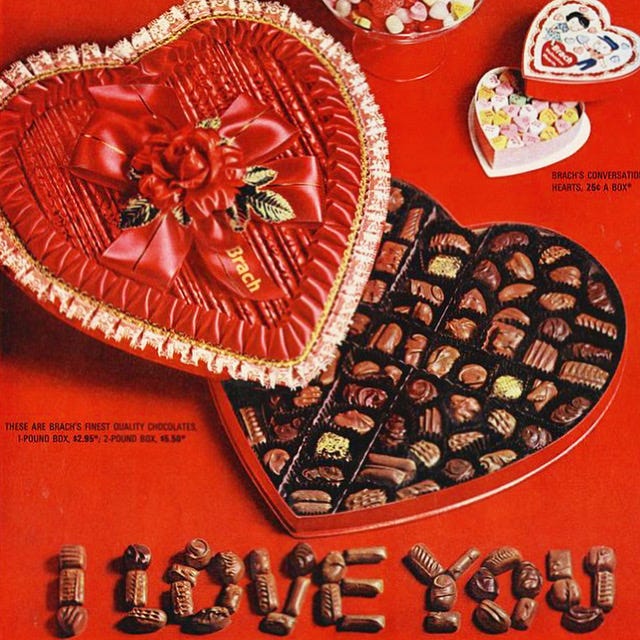Fluxblog 456: BIG BEAT is back, baby!
Plus a classic R&B playlist and new songs by Bad Tuner, Idles, and Sleater-Kinney
This week’s playlist is VALENTINES CANDY: VINTAGE SOUL HEARTBREAKERS, 90 minutes of lovelorn R&B ballads and break-up songs from the 1960s featuring classic music from Motown, Stax, and Chess, though there’s only a few songs I think you’d definitely know. I was planning on doing a companion playlist for this with upbeat love songs from the same milieu but I’ll be real with you, this one has been performing poorly thus far so I’d need you all to give me some signal that it’s worth finishing. [Spotify | Apple | YouTube]
Spotify users take note – FLUXCAVIAR, my ongoing playlist for new music, has been rebooted for 2024. If you’re already subscribed you’re still subscribed, but the playlist is entirely different from how it was a few weeks ago and I’ve been steadily updating it with new songs as they drop.
Apple Music users take note – I wrote an uncredited review of the new The Smile album Wall of Eyes accompanying the record on that platform. It’s an outstanding album, my favorite record Thom Yorke has made outside of the Radiohead canon.
Be A Problem To Those In Power
Bad Tuner “24 Hours”
“24 Hours” isn’t just the first great Big Beat song to come along in a long time, it’s a Big Beat song that stands up to the very best of The Prodigy, Fatboy Slim, The Chemical Brothers, or The Crystal Method in their late 90s prime. This track is a dense ecosystem of dynamic shifts crafted to keep you moving and it’s so effective that you can feel helpless to it, like Bad Tuner is remotely hijacking your body or just throwing you around like a doll. The aggression isn’t limited to how hard the beats slam – the vocal clips are furious and defiant and confident in the power of resisting “those in power,” and the textures and random sounds owe a lot to The Bomb Squad at Public Enemy’s peak. There’s no getting around how this is a style rooted in another era but this doesn’t feel retro to me, more like a new artist harnessing the power of old techniques to make something fresh and forceful for this moment in time.
Buy it from Bandcamp.
No God No King
Idles “Grace”
Some songs sound like they’re driven by an idea – some kind of mission – that pushes the artist out of their comfort zone. “Grace” feels very different from any Idles song I’ve heard before, much more delicate and far less monochromatic without losing the post-punk tension at the core of their sound. The song sounds like pastel light breaking through a grey haze, some softness and beauty contrasted with harsh and rigid mechanical utility. Joseph Talbot is singing about love on a grand scale, about true solidarity for humanity at large. The verses read like a prayer but the song overtly rejects religion, or at least the institutional structure around it. The idea here, simple as it is, is laid out in the chorus – let go of institutions, let go of the things that control us, embrace love. Talbot is hardly the first to propose this, but he and his band make an excellent case for it here.
Buy it from Amazon.
Teeth That Bite Like Candy Spikes
Sleater-Kinney “Small Finds”
Corin Tucker’s lyrics in “Small Finds” jumble up hunger, sex, and violence in a way where it’s unclear whether she’s singing about animals or humans. It’s all primal urges and survival instincts, but it’s also totally unapologetic pleasures. Tucker’s fierce and uninhibited voice is perfect for a song with these themes, but so is Tucker and Carrie Brownstein’s guitar attack, which is about as gnarly as they’ve ever sounded. I can imagine them approaching the same idea with a more cerebral and ironic angle, but I think going for wild vulgarity and brutality is the more honest and compelling move.
Buy it from Amazon.
LINKS LINKS LINKS LINKS LINKS
• Here’s a great essay by Elise Soutar about a lot of things - growing up as a Taylor Swift fan but growing out of it in adolescence, her discomfort with how people talk about “girlhood” now, a tribute to Mary Weiss and the Shangri-Las. A lot of sharp opinions, a lot of style.
• Ryan Antiart has been on fire lately, I particularly liked his slam on pretty much everything about Lil Nas X’s career.
• Here’s Kieron Gillen with a tribute to the music critic Neil Kulkarni, who recently passed away at 51, far too young. Gillen, who is mainly known as a comics writer now but has spent a lot of his career as a critic, makes a great case for Kulkarni’s body of work but also for the value of critical writing in general. A lot of wisdom in here.
• Jacqueline Codiga wrote about the grim state of the music industry and the commercial music media, and as she says “push back against the idea that this decline in the ‘value’ of music and music journalism is because people don’t care.”
• The Alvin and the Chipmunks cover of Blondie’s “Call Me” slowed down to the session singer’s natural timbre is one of the best goth dirges I’ve ever heard. (Via Roxy Demento.)
• Nick Sylvester has returned to blogging with a post looking back on his run as one of the defining voices of the early days of Pitchfork. (He doesn’t say that, I’m saying that.)
• Mark Richardson, one of the all-time best Pitchfork writers and former editor-in-chief of the publication, wrote a lovely tribute to each of the staffers he’d worked with who were laid off last week.






